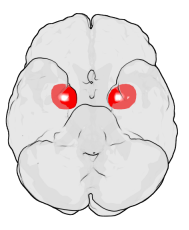I have been reporting about brain implants for a long time. (Click the brain link above to see a slew of them.)
Well, it seems that we are now using these implanted electrodes to help alleviate folks with severe depression. (Folks with Parkinson’s have been enjoying the results of brain implants for a while.)
This is not a snap option. The process requires two separate brain surgeries- after recording days of brain signals to ascertain the proper neural biomarker (pattern of activity) for each individual’s symptoms. In the current case, the recording was effected over 10 days and for some 10 different parts of her brain. The subject was suicidal, unable to control her condition with drugs or electroconvulsive therapies, for her whole life.

The medical team headed by Dr. Katherine Scangos (UCSF) discerned specific activities (gamma brainwaves) in her amygdalae. These two structures have long been linked with emotions in the body. The implant dealt with her right ventral capsule/ventral striatum (VC/VS). (This was reported in the article, “Closed-loop neuromodulation in an individual with treatment-resistant depression”.)
This is personalized medicine. Because there is no unique biomarker for depression. (This is why the previous approaches have failed- it was assumed “one size fits all”.) But once the work is done and the implant is in place, the results are amazing. The implant is triggered only when needed (let’s say about 300 high frequency signals for 6 second clips each day) whenever the symptomatic brain activity is detected. The signal was attenuated to a level that the patient did not “notice” the activation- except for the results.
Two electrodes were implanted, which only “fire” when one of the electrodes determines the gamma waves in the amygdala.
After a year of operation, the patient reports that “life is easier”. She is engaged in hobbies and is no longer suicidal.
This is a vital advance- and not just because the patient has had life-long symptoms. Because many folks find that one drug fails to achieve the desired results and others who feel better simply stop taking their meds and suffer a relapse. And, some 10% of us have prescriptions to treat depression.
11 more patients will undergo the operation/analysis shortly.
(Note that this process is used for those with epilepsy- with the same extensive recording duration. And success.)








